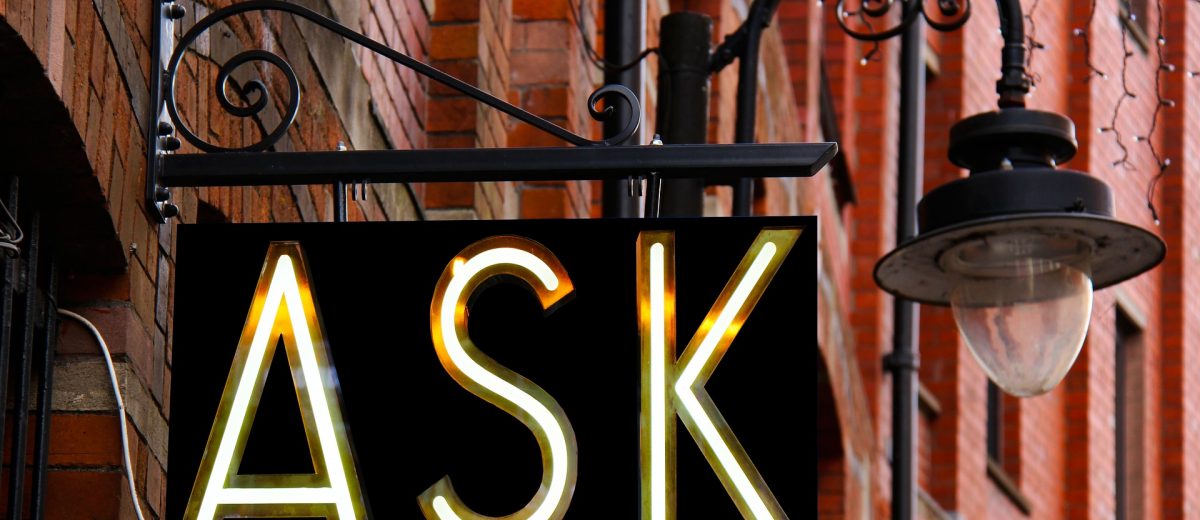日本語には敬語があり、英語には敬語にあたる表現はない。というのは本当でしょうか?
確かに、「拝見する−見る−ご覧になる」のように、体系立てて動詞を変化させる様な文法的ルールはありませんが、英語にも、丁寧で、相手を尊重する際に使う表現というのが存在します。
厳密には、英語話者は人に物事を聞いたり頼んだりするときは、自分と相手との距離感に応じて、非直接的な表現を用いることでそれを表します。非直接的であればあるほど「丁寧」な表現との理解です。
注意したいのは、英語話者は、後輩−先輩、子供−両親、部下−上司のような「タテ」の距離感ではなく、自分とどれだけ親しいかの「ヨコ」の距離感で、適切な表現を選んでいるところです。
つまりは、明らかに年下の人でも、初めて会う人にはかなり間接的な表現で物事を頼むべきですし、毎日顔を合わせているであれば、上司に対してでもある程度直接的な表現を使うことで親密さを表すのが良いでしょう。
さて、今回は、知らなければ失礼になる英語での丁寧表現について学んでいきましょう。
The way you communicate can make or break a business relationship.
On top of keeping communication positive and productive, it’s good to ask things in a polite and respectful way. You can do that by using indirect questions.
Stick around as we explain what indirect questions are and how to use them!
To understand indirect questions, it’s useful to know what a direct question is. A direct question is, well, direct. It’s what you would think of as a “normal” question: the “yes/no” questions, “wh-” questions, and choice questions.
Here are a few examples of direct questions:
– Have you made me a pizza? (yes/no question)
– What did you work on today? (wh- question)
– Does she prefer Christmas or New Year’s Eve? (choice question)
– Where is the office? (wh- question)
– Are you coming to the office party? (yes/no question)
Indirect questions are different. They’re less direct, often more formal, and are usually seen as more polite—that’s why they’re great in many business situations.
These questions don’t follow the same rules as direct ones. Rather than asking something directly, they’re placed inside another question or statement. So, instead of just asking, “What time is it?” you’d ask something like “Could you tell me what time it is?”
These are some common ways to begin indirect questions:
– Can/could you tell me . . . ?
– Can/could you let me know . . . ?
– Would you mind . . . ?
– Do you know . . . ?
– Would it be possible . . . ?
– I was wondering . . . (Don’t use a question mark here because this is a statement, not a question.)
– Do you have any idea . . . ?
Now, let’s take the direct questions from earlier and turn them into indirect questions to see the differences a little better.
| Direct | Indirect |
| Have you made me a pizza? | Could you tell me if you have made me a pizza? |
| What did you work on today? | Can you let me know what you worked on today? |
| Does she prefer Christmas or New Year’s Eve? | I was wondering whether she preferred Christmas or New Year’s Eve. |
| Where is the office building? | Do you know where the office building is? |
| Are you coming to the office party? | Do you have any idea whether you’re coming to the office party? |
– If a direct question uses “is” or “are,” it will go at the end of an indirect question.
→ Where is the office building? (direct)
→ Do you know where the office building is? (indirect)
– We don’t use the auxiliary verbs do/does/did in indirect questions.
→ What did you work on today? (direct)
→ Can you let me know what you worked** on today? (indirect)
**Notice that, because we have the past tense “did” in the direct question, we use the past tense “worked” in the indirect question. Always make sure to use the right verb tense.
– If there is an auxiliary verb in your indirect question, it will go after the subject.
→ Can he finish the presentation? (direct: the auxiliary verb “can” goes before the subject “he”)
→ Do you know if he can finish the presentation? (indirect: auxiliary verb “can” goes after the subject “he”)
Using “if” and “whether”
You might have noticed that some of our example sentences above use either “if” or “whether.” These are generally used the same way, but “whether” tends to be more formal. Generally, you use “if” or “whether” in:
– Choice questions
→ I was wondering whether she preferred Christmas or New Year’s Eve.
– Yes/no questions
→ Could you tell me if you’ve made me a pizza?
Note: There are some yes/no questions in which “if” won’t work. For example, “Would it be possible . . .” usually includes an infinitive verb.
→ Would it be possible to finish this tomorrow?
→ Would it be possible for you to finish this tomorrow?
With yes/no questions(not choice questions), you can also include “or not.”
– “If” question: Put “or not” at the end of the question.
→ Could you tell me if you’ve made me a pizza or not?
– “Whether” question: Use it directly after “whether,” OR at the end of the question.
→ Do you have any idea whether you’re coming to the office party or not?
→ Do you have any idea whether or not you’re coming to the office party?
Question everything
Ready to practice?
Here are some things you can try:
– Look for direct questions in your everyday life (in conversations, on blogs, in YouTube videos, in books, etc.), and convert them into indirect questions. For instance, if you’re at the grocery store and you hear someone ask a salesperson, “Are these apples on sale?” you can think to yourself, “Could you tell me if these apples are on sale?”
– Have a friend or family member ask you direct questions (about anything at all). Instead of answering their question, say it back to them in indirect form.
– Listen to others around you: The more you hear indirect questions, the more you’ll know what sounds natural.
Getting indirect questions right takes some effort—using the right words in the right order can sometimes be frustrating. But as you know, the more you practice, the better you’ll get!
(引用元:How to Use Indirect Questions in English / Andrea Byaruhanga)
とはいえ、筆者の個人的な経験ですが、あまり超直接的な表現で人に物事を頼む人を見たことはありません(Pleaseをつけても直接的であれば丁寧な表現にはなりません)。
レストランでお冷を頼むときに、”Please bring me a glass of water.” なんて言う場合は、怒っている時だけです。お店のスタッフはきっとびっくりします。普通にお水が欲しいときは “Can I have a glass of water?” 程度に間接的な言い回しをします。
逆に、”Would you mind if I asked you to bring a glass of water?”というのは(お客さんが席に着いたら水を持ってくることが常識である)レストランという場所では、言い過ぎ表現となります。
Gabbyでは、随時無料トライアルを受付中!
毎日のセルフ・トレーニングに合わせて、英語ネイティブスピーカーであるパーソナルコーチと1対1のライブセッションをします。ライブセッションは、表現力を磨くチャンスです。誰に気兼ねすることなくどんどん質問をして、TPOに合わせた表現を身につけましょう。
お申込みはこちらからいつでも受け付けています。




